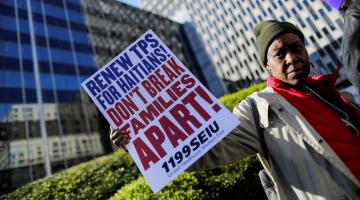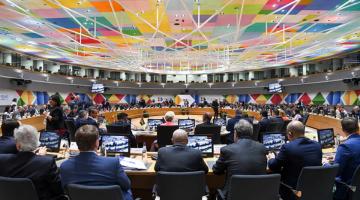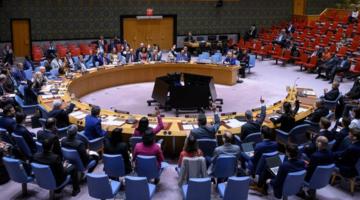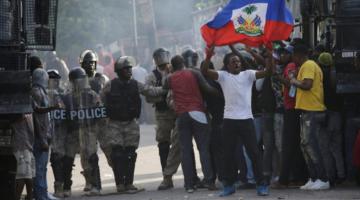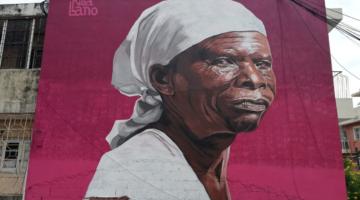"Thousands of people - most of whom were supporters of Lavalas - were killed, disappeared, or forced into exile."
This article originally appeared in Haitian Action.net.
In July of 2007, I took my first visit to Haiti as a member of a human rights fact-finding delegation sponsored by the Haiti Action Committee, a California Bay Area solidarity organization. Since my coming into Black consciousness as a teenager in the late 1960s, I revered the Haitian Revolution and its ability to defeat three imperialist powers, France, Spain and England. Most of my life the names of Haitian revolutionaries Boukman, L'Ouverture and Dessalines have been evoked during libations and served as inspirations for my comrades and me.
As most socially conscious sons and daughters of Afrika, I was concerned about the marginal position of Haiti, the first Black republic in the western hemisphere, in the contemporary world. Boarding the plane from Miami to Haiti, I was reminded of the imperialist world's treatment of Haiti, as airline personnel spoke harshly and impatiently to its Black (predominantly Haitian) customers while boarding them. Once on the plane and in the air, I noticed American stewardesses, generally deferential and helpful, were non-responsive and curt with Haitian patrons in the coach section of the plane. The airline prepared me for the political reality of Haiti's relationship with the United States and Europe.
"One clearly sees evidence of the demand of millions of Haitians for the return of their beloved President, Jean Bertrand Aristide."
Entering the country evoked pride, as I observed advertisements with beautiful Black people with dark chocolate skin and instructions in French, English and an Afrikan diaspora language, Haitian Kreyol. I immediately noticed the people, landscape, and structures of Haiti were reminiscent of my trip three years prior in Ghana. In the city of Port au Prince, one clearly sees evidence of the demand of millions of Haitians for the return of their beloved President, Jean Bertrand Aristide, who was kidnapped by U.S. Special Forces during the Coup of 2004. Everywhere in the city, graffiti is present stating "Aristide Aptounen (Aristide is Returning)."
Also a part of the political landscape is the presence of United Nations military forces occupying Haiti. The United Nations Stabilization Mission in Haiti (MINUSTAH) contains military and police personnel from over forty different countries. While under the banner of "peace-keeping," popular organizations in Haiti see the role of MINUSTAH as maintaining the imperialist domination of Haiti for the United States, France and Canada, the position of the Haitian elite, and the continued oppression of the masses. In the tradition of other occupying militaries, we also heard reports of MINUSTAH forces raping Haitian women and shooting nonviolent demonstrators and children.
The Popular Movement
Our delegation met representatives from popular organizations and institutions from Port au Prince and from the northern region of Haiti. We met women's organizations, labor movement forces, media workers, educators, peasant organizers, municipal politicians and human rights advocates. Most of the activists I met were members or associates of Lavalas. Lavalas (Kreyol for the people's flood) is the party of Aristide that has its base among Haiti's working class, peasantry and poor. While the Coup and the abduction of Aristide by U.S. Special Forces constituted a major setback for Lavalas and the Haitian popular movement, they are not defeated. In June of this year, the organization of transportation workers went on a two-day strike protesting increased prices for gasoline and licenses for taxis, which in turn raised prices for consumers. Gas prices had increased 20% in a two week period, in spite of oil contributed to Haiti by Venezuela at low cost. The strike paralyzed Port au Prince and other urban centers and demonstrated the power of the Haitian popular movement, even under occupation.
"Fondasyon Trant Septanm was established to aid the victims of the right-wing coups of 1991 and 2004, including those tortured, sexually abuse, politically interned, and families of those assassinated and massacred."
One of the most brilliant and passionate people I (ever) met was Lovinsky Pierre-Antoine. Brother Lovinsky is a psychologist and the National Coordinator of Fondasyon Trant Septanm (Haitian Kreyol for September 30th Foundation). Fondasyon Trant Septanm was established to aid the victims of the right-wing coups of 1991 and 2004, including those tortured, sexually abuse, politically interned, and families of those assassinated and massacred. Lovinsky had to flee the country during the 2004 coup but has returned to continue his organizing. He not only gave our delegation an excellent overview of the current state of human rights in Haiti, but eloquently described Haitian history, culture and religion. Nearly two weeks after our return to the United States, it was reported that Lovinsky had disappeared and was presumed kidnapped. In a sobering way, the disappearance of Lovinsky demonstrated to me that the forces of terror were alive and well under MINUSRAH and the Preval government. While concerned and worried for his welling being, the apparent abduction only steeled my conviction that the occupation and this inhumane regime mush be overturned in the interest of liberty and human rights.
Brother Lovinsky and other activists spoke of the hundreds of political prisoners remaining in Haiti's prisons. Under the coup and U.S. (Marine) intervention, not only was Aristide snatched against his will by U.S. military, but 7500 elected officials were removed from government. Thousands of people - most of whom were supporters of Lavalas - were killed, disappeared, or forced into exile. The U.S. and U.N. supported coup government organized a police force controlled by the Haitian elite who went about the business of incarcerating Lavalas elected officials, activists, and supporters. Despite the election of President Rene Preval in Feburary, 2006, Haiti is still under foreign occupation and the issue of political repression is still a major question. While some notable political prisoners like political organizer Paul Raymond and spiritual leader and singer So Ann have been released under the Preval government, Haiti's prisons are full of Lavalas members and associates. Political prisoner Rene Civil, a Lavalas activist who helped lead resistance to the coup, has been incarcerated for many months by the current government. Due to the horrible conditions in Haitian prisons (overcrowded, lack of fresh water, food, and medical care), prisoners are literally dying while incarcerated. With law enforcement and the courts controlled by the wealthy elite political prisoners are held indefinitely without trials.
The Coup also brought the interruption of the social justice project of Aristide and Lavalas. Under the Aristide/ Lavalas government literacy, school construction and health care initiatives were implemented to develop Haiti's most valuable resource-its people. Investing in Haiti's people would advance the country from poverty, disease and underdevelopment.
Cite Soleil
The symbol of Haiti's underdevelopment and poverty is Cite Soleil. Cite Soleil is a highly populated shanty town located on the edge of the capital city of Port au Prince. Estimates of its population range from 300,000 to 500,000. I have traveled to Africa and other Caribbean countries in the past, as well as the slums and ghettoes of the United States, but Cite Soleil possesses the largest concentration of poverty I have ever witnessed. The poorest residential section of the poorest community in the possibly poorest country in the western hemisphere is called "little Haiti." There we saw hundreds of people living without running water, electricity, and children without clothes. While she had been there before, our Haitian guide was overwhelmed by tears due to the condition of her people in "little Haiti." Later on our trip, a peasant organizer explained that the massive poverty of Cite Soleil is the result of the policy of the Duvalier dictatorships of the late 1950s until 1986, which encouraged rural people to leave the country to move to the city. In rural areas, as their ancestors have done for centuries, Haitian peasants were able to feed and provide shelter for themselves. Transplanted in the cities they had no land to cultivate, while the Haitian elite took over terrain abandoned by Haitian peasants.
"Cite Soleil possesses the largest concentration of poverty I have ever witnessed."
Parallel with the impact of poverty is the reality of the UN occupation in Cite Soleil. The buildings in the commercial district are riddled with bullet holes of large caliber weapons. UN troops (primarily from Jordan) and tanks were ever present. While the UN forces and Haitian government claims it attacked Cite Soleil to root out criminal gangs, activists argue the repressive occupation of the area was to conduct a "search and destroy" campaign on supporters of Lavalas. As we were guided through the residential zone, UN soldiers took our pictures. When we took their pictures, these same soldiers hid "like roaches when you turn the light on." If they were proud of their mission why were they hiding?
While poverty and the existence of occupation are ever present in Cite Soleil, so is the legacy of Aristide and the Lavalas government. Beside the presence of graffiti demanding Aristide's return or saluting slain (by occupation forces) Lavalas militant Dred Wilme, a park exists as a common space in the centre of Cite Soleil that was built by the socially conscious President. Before his rule in Haiti, parks were reserved for the rich. Poor children did not deserve recreation space. This is one small example of efforts by Aristide and the Lavalas government that made them untenable to the rich elite of Haiti. How dare they spend the nation's resources on poor people? How dare they want to raise the minimum wage from 32 cents (US) to 70 cents? How dare they provide schools and literacy programs and health care to the poor?
2007: The Monroe Doctrine Lives
Our delegation concluded that human rights and popular democracy are still denied in Haiti today. While the massacres that occurred during and after the 2004 coup have mostly ceased, the existence of political prisoners and the continued suspension of the Lavalas project of social justice for the workers, peasants and poor demonstrated foreign interests, particularly the US, France, and Canada, and the greedy Haitian ruling elite remain an obstacle to the interests of the Haitian people. In spite of the popular demand for Aristide to return to Haiti, imperialism and rich and right-wing Haitians exercise the power to prevent the former President's residence in the country of his citizenship and birth. This is evidence of the denial of the Haitian people's sovereignty and self-determination.
"Imperialism and rich and right-wing Haitians exercise the power to prevent the former President's residence in the country of his citizenship and birth."
On my return many I talked to asked the following questions after hearing my report of our trip. Why would the United States apprehend a popularly elected President of a sovereign nation and take him without his consent to another continent? Why would the United States prevent him, not only from returning to his country, but deny him asylum in the Caribbean? Why is the United States aligned with elements in Haiti that not only wish to deny basic human rights of the overwhelming majority of Haitians but have a history of massacre, drug dealing, and robbery of the nation's wealth?
Many of us educated in the United States have accepted the white supremacist and imperialist orientation presented to us in school and the corporate media. Particularly in the western hemisphere, the policy of the rulers of the United States is to not tolerate governments that promote self-determination. Jean Bertrand Aristide is loved by the Haitian masses and hated by the Haitian elite and their U.S. allies because he dared to be an advocate of Haiti's poor. The Haitian elite controls sweat shops that manufactures for Walmart, Target, Disney and Levis. As a Haitian labor leader told our delegation "When you wear a t-shirt, you're wearing the blood of a Haitian." When Aristide articulated that the minimum wage had to be increased and the wealth of the nation needed to be shared with the working class and poor by building schools and hospitals, he threatened the interests of not only the rich Haitian elites, but global capitalists of the U.S., France and Canada. In his effort to protect the interest of the workers, peasants and poor, Aristide resisted U.S. and elite Haitian demands for privatization of the public sector. For the rulers of the United States, Aristide was potentially another Castro or Hugo Chavez. While the rhetoric of the (US) empire we are subjects of tells us it supports elections and democracy, it has a history of supporting dictatorial criminals to overthrow popularly elected democrats who wish to develop their nations and assert their people's integrity and independence. Remember Mossadegh in Iran (1953), Arbenz in Guatemala (1954), Lumumba in the Congo (1960), and Allende in Chile (1973). Remember that the rulers of the United States have opposed an independent Haiti since its inception.
A Message from Haiti to the Black/ New Afrikan community in the United States
As an Afrikan born in the United States, I was embraced by my Haitian brothers and sisters. I traveled to Haiti in a multi-racial delegation. While enthusiastically welcoming all of us, our Haitian hosts intentionally acknowledged the presence of Nia Imara, a resourceful and talented graduate student and activist, and I, the Black folks in the delegation. We were constantly told that we were the same people with the same blood. Our Haitian sisters and brothers expressed their concern for the people of New Orleans and the Gulf Coast as the images of governmental neglect as Black people were left to die during Hurricane Katrina. The San Francisco 8 Black Panther veterans, now being held as political prisoners, sent their solidarity to the Haitian people through members of the Haiti Action Committee. Our Haitian hosts definitely understood as we shared with them about political prisoners in the United States and exchanged messages of solidarity. When our people suffer in the United States, Haitians feel our pain. In turn people of Afrikan descent in the United States must make Haiti a priority in OUR foreign policy. Inside the U.S. empire, we must fight for the return of Aristide, the freedom of Haitian political prisoners, social justice for Haitian workers, peasants and poor and the end to UN occupation as we fought for the end of apartheid and the freedom of Mandela and South African political prisoners. Our Sisters and Brothers are depending on us.
To the Haitian People
To the people of New Orleans
To Political Prisoners
KENBE FEM PA LAGE!!!!
(In Kreyol: KEEP IT UP DON'T GIVE UP!!!)
Akinyele Umoja is a founding member of the New Afrikan Peoples Organization and the Malcolm X Grassroots Movement. He is also an Associate Professor of African-American Studies at Georgia State University in Atlanta, Georgia. He can be contacted AADAKU@langate.gsu.edu.

